a radical Socialist and Premier from April 1938; followed Neville Chamberlain's appeasment policy, which ceded the Sudetenland of Czechoslovakia to Germany; resigned as Premier in March 1940 after failing to unite either parliament or the French people behind his cautious approach to mobilization and involvement in the 'Phoney War'; was subsequently interned by the Vichy government and tried in February 1942 for betraying his country; was deported to Germany and held there until the end of the war, when he successfully returned to French politics.

C-in-C of the French Navy at the start of the war; after the fall of France in June 1940, assured British Prime Minister Churchill that his ships would never fall into German hands but, instead of delivering them to British ports, ordered the fleet to colonial bases in North Africa, provoking a series of diabling attacks by the British Mediterranean Fleet; at the same time accepted the post of Minister of Marine in the Vichy government, becoming Vice-Premier the following February; pursuing a policy of limited collaboration with the Axis while hinting to the Americans that he would welcome strong Allied intervention, excited the mistrust of both sides; early in 1942, was appointed C-in-C of French armed forces and High Commissioner in North Africa; at the time of the Allied TORCH landings in Northwest Africa, was in Algiers visiting his sick son; his influence in French military circles was such that he was quickly called to negotiate a ceasefire with General Mark Clark when it became clear that Allied troops were meeting resistance; characteristically, wavered until Hitler occupied Vichy France on Novermber 11, at which point he came down firmly on the Allied side; 2 days later was officially endorsed by General Eisenhower as the political head of French North Africa; this arrangement was effective in securing French co-operation in the theater, but provoked public outrage among the Allies, particularly in Britain where de Gaulle was active in stirring up protest against a man hitherto presented as a pro-Nazi; on Christmas Eve 1942, was assassinated by a young French monarchist, sparing the Allies further embarrassment and easing relations with French colonial forces.
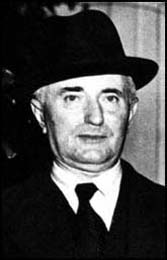
veteran of Verdun (1916); instructor at the Saint-Cyr Military Academy; an outspoken prewar advocate of mobile mechanized warfare; fought gallantly in the 1940 Battle of Flanders before fleeing the collaborationists to set up the headquarters of the Free French Forces in London; a proud and prickly patriot, insisted that the French be treated as an equal partner by the Allies, although France, under occupation, had few assets to offer in the war; had a stormy relationship with Churchill and Roosevelt, but his courage and determination made him the supreme political figure of wartime France; became prime minister of France in 1944; after more than a decade out of politics, returned as president of the 5th Republic in 1958.
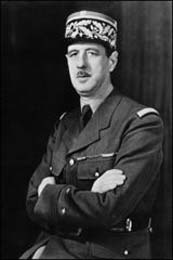
French cavalry officer who remained in the Vichy French Armistice Army, the token French force allowed by Germany after the fall of France in 1940; was imprisoned in 1942 for his opposition to the German occupation of the southern zone libre (free zone) but escaped to England and joined de Gaulle; participated in the invasion of southern France and commanded the French 1st Army during the campaign in Northwest Europe; after the war he commanded French forces in Indochina.
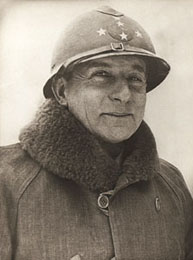
highly respected commander of the British 2nd Army which landed in Normandy on D-Day and successfully drove the German armies out of northern France during 1944, for which he was knighted; had already distinguished himself at Dunkirk, where he commanded a rearguard action fought by the 13th Infantry Brigade; also served with the 8th Army in the latter stages of the Desert War and with Montgomery for the invasion of Sicily and then Italy where he commanded the XIII Corps.
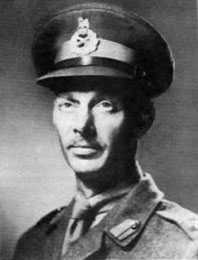
popular commander of the US 6th Army Group which fought throughout the Allied campaign in Northwest Europe, his relaxed style of leadership may have contributed to Supreme Allied Commander Eisenhower's periodic uncertainty about Devers' judgement; having acted as Eisenhower's caretaker in command of ETOUSA (European Theater of Operations, US Army) during 1943, was sent to command NATOUSA (North African Theater of Operations) and then SACMED (Supreme Allied Command, Mediterranean) before returning to France to command the US 6th Army Group; although his troops were employed as a subsidiary force to the Army Groups under Bradley and Montgomery, his command nevertheless played an important part in the campaign.
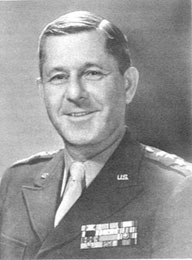
commander of Hitler's SS bodyguard and later of an SS Panzer Army; an ex-sergeant major of World War I, his early career was typical of the Nazi Party member; experience in the Freikorps, a period of unemployment and spare time thuggery in the SA preceded his full-time entry in the SS in 1928; commanded the 1st SS Panzer Division, which had evolved from the Leibstandarte Adolf Hitler, the elite personal SS guard, in the Western Offensive in 1940, the Balkans, and on the Eastern front for the invasion of the Soviet Union, where the Waffen SS (Armed SS) speedily developed a fighting reputation; later commanded a Panzer Corps of 3 SS divisions against the Allied invasion of Normandy; though without staff training or the military background of his colleagues, his coarse, foul-mouthed temperament and style of leadership was perhaps well suited to the troops he led; following the failure of the German offensive in the Ardennes in late 1944, his 6th Panzer Army was moved southeast for Hitler's final offensive of the war at Lake Balaton in Hungary, and was then sent to defend Vienna, where advancing Soviet armies routed his formation; widely held responsible by the Russians for the murder of Soviet wounded at Kharkov in March 1943, was perhaps more anxious than most to surrender his units to American forces in May 1945; sentenced to 25 years imprisonment by a US court, served less than 10; could certainly count himself lucky that he never stood trial on Soviet charges; died, a free man, Ludwigsburg, although he did serve a further term of imprisonment, having been found guilty by a West German court of taking part in Hitler's purge of the SA in 1934.
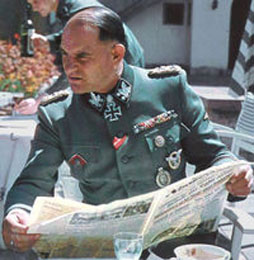
highly respected commander of 1st Corps, BEF, which he trained and led in France in 1939; returned from France in April 1940 as Vice Chief of the Imperial General Staff; succeeded Ironside in May as Chief but was replaced on Churchill's order at the end of 1941, following a stormy period of conflict between Churchill's impetuous approach and Dill's personal and professional caution; accompanied Churchill to Washington as head of the British Joing Staff Mission; remained there as Senior British Office on the Combined Chiefs of Staff Committee; enjoyed considerable diplomatic and personal success and established important relationships with Roosevelt, General Marshall and Admiral King; died in November 1944 and was buried at Arlington National Cemetery in recognition of the affection felt for him by the American military establishment.
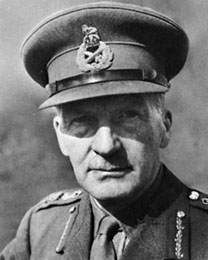
German naval officer and Führer in brief succession to Adolf Hitler; commissioned into the German Imperial Navy in 1910, was a submariner in World War I, but spent the post-war years in a navy without submarines, rising to the rank of commander aboard surface ships; in September 1935, was given command of the German Navy's first flotilla of 3 new submarines and over the next 4 years controlled the tactical and technical developments of the U-boat arm; durint this period was at odds with the 'big ships' policy of the German naval High Command under Raeder, who also forbade the introduction of 'wolfpack' tactics which Dönitz strongly advocated; instead of the 300 U-boats he claimed he needed to defeat Britain, he went to war in 1939 with 57 - 39 of which were fully operational; promoted to Rear Admiral in 1939, led the U-boat arm with conspicuous success in the early years of the war; deployed his forces shrewdly, finding weak spots in Allied defenses throughout the Atlantic and consistently increasing the pressure on trade routes before March 1943; the 'wolfpacks' in particular proved highly effective when they were eventually deployed from late 1940; U-boat crews were superbly trained and their morale was enhanced by Dönitz's personal commitment to his commanders, who responded with panache and daring in the field; during this period he argued consistently (but largely in vain) against the dispersal of his forces to othere theaters and in favor of greater concentration of production and scientific resources on U-boats; his frankness and technical mastery impressed Hitler, who had become utterly disenchanted with his surface fleet by the end of 1942 and insisted that it was scrapped; Raeder, its champion, was forced to resign; Dönitz was promoted to Grand Admiral and became C-in-C of the German Navy on January 30, 1943; his first achievement was the reinstatement of the surface fleet, which he persuaded Hitler to maintain in a limited role; next secured steel allocations for a building program concentrating on small craft, particularly U-boats, over which he continued to exercise direct control; his deployment of submarines after their Atlantic defeat in the spring of 1943 was largely defensive pending the development of new weapons to defeat the Allied anti-submarine groups; acoustic torpedoes, schnorchel breathing masts and improved boats were introduced before the end of the war; losses were curtailed and the U-boat fleet grew steadily throughout 1944 but never again posed a serious threat to Allied convoys; in early 1945, organized the evacuation of troops and refugees from the Russian advance on the Eastern Baltic, perhaps the most successful German surface operation of the war; his unequivocal acceptance of National Socialist Germany had underpinned his command successes; in the final stages of the war with Göring, Himmler and other leaders discredited, he earned the dubious reward of being the Führer's named successor as head of state, a post he assumed in Schleswig-Holstein at the end of April 1945; the new Führer appointed a cabinet of his choice (not the one willed on him by Hitler), which effectively dismissed the Nazis from government; negotiated the surrender of the German forces in the west and was arrested by the Western Allies at Flensburg on May 23; convicted as a major war criminal at Nuremberg on charges of planning a war of aggression, served a ten-year prison sentence in Spandau, Germany.
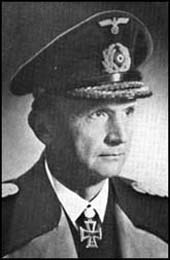
New York lawyer, veteran of World War I and confidante of President Roosevelt, who appointed him to head the newly created Office of the Coordinator of Information (COI), (which Donovan had himself suggested) in July 1941; the creation of the COI represented Roosevelt's commitment to agitational propaganda and psychological warfare, in contrast to the limited information propaganda authorized via the Office and Government Reports and the information division of the Office of Emergency Management; his clandestine menu of activities included 'black' propaganda (now known as 'disinformation'), the use of rumor, deceptions and lies, which would transform propaganda into 'an attack weapon. . . the arrow of initial penetration . . .' The COI was the predecessor to the OSS, which Donovan took over at its inception in July 1942.
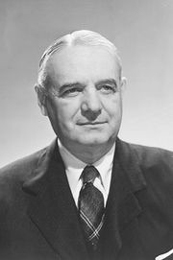
US Army Air Force commander, a businessman and former record-breaking racing pilot, was recalled to active service from the reserve in 1940, to work with industrial leaders at the conversion of the motor industry to aircraft production; is best known, however, for leading a raid by 16 B-25s on a spectacular and near suicidal mission from the US Navy carrier Hornet to bomb targets in Tokyo, Yokohama, Hokusuka, Kobe and Nagoya, on April 1, 1942; though the direct military impact of the 'Doolittle Raid' (also known as the First Special Aviation Project) was limited, the attack greatly boosted American morale and the longer-term strategic implications of the mission proved immensely important to the outcome of the Pacific War; the raid also earned him immediate promotion to Brigadier General and the Congressional Medal of Honor; subsequently commanded the US 12th Air Force, created for the TORCH operations in Northwest Africa and became Commander of the Northwest African Strategic Air Force the following year; in 1944, now in command of the 8th Air Force in Britain, was created an honorary Knight Commander of the Order of the Bath by King George VI; the following year he took the 8th Air Force to the Pacific.
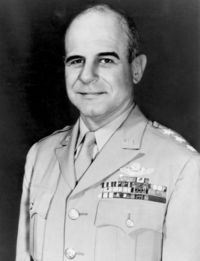
Admiral of the Royal Netherlands Navy and commander of the combined Dutch, British, American and Australian (ABDA) cruiser and destroyer force which was created on February 14, 1942 to challenge the Japanese advance through the Dutch East Indies; the force and its commander operated under the greatest possible handicaps, having never worked together as an integrated unit and therefore lacking a common tactical doctrine or communications system; its first major operation, the Battle of the Java Sea (February 1942), saw the loss of its flagship, the Dutch light cruiser De Ruyter, and its commander.
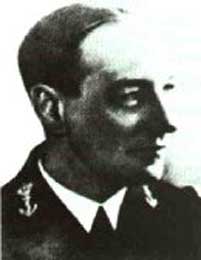
Assistant Chief of the British Air Staff at the outbreak of war, succeeded Dowding as head of the RAF Fighter Command in November 1940 and switched operational emphasis of his forces from defense to attack; with the object of drawing Luftwaffe units into battle, massed daylight fighter sweeps were undertaken against targets of opportunity along the German-occupied coast of northern Europe which caused considerable local disruption and provided his short-range interceptors with some, albeit strategically marginal, offensive function; was appointed successively C-in-C RAF Middle East in 1943 and then C-in-C Coastal Command for the invasion of Normandy; after the war became C-in-C and Military Governor of the British Occupation Zone in Germany.
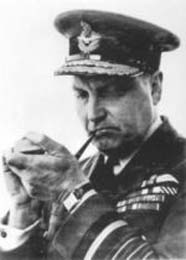
uncharismatic but tactically well-informed Commander of the RAF Fighter Command from 1936-40; was responsible for the organization of Britain's home defense air force and instituted a strictly centralized control system for the deployment of his numerically stretched forces; in June 1940 insisted on the retention of his main fighter strength in Britain during the Battle of France, and the following month his system went into effect in the Battle of Britain; based around early warning radar and the sparing commitment of fighters against definite targets, his tactics frustrated the Luftwaffe's repeated attempts to force a decisive major confrontation and were the most important factor in enabling Fighter Command's eventual victory; was nevertheless criticized within the RAF by those, notably Air Vice Marshal Leigh-Mallory, who sought a more aggressive seek-and-destroy role for Fighter Command; despite his victory, was removed from his post in November 1940, at a time when Fighter Command was having little success against Luftwaffe night bombers, and replaced by Sholto Douglas; served for a time on a Ministry of Aircraft Production mission to the US and Canada in 1941 before retiring the following year.
